Demanding They Be Heard: MacFarland Middle School Students Take Up BLM at School Guiding Principles and Demands
By Kimberly Ellis
Uh, with your bad self. Say it louder. I’m Black and I’m proud. Say it louder. I’m Black and I’m proud.
James Brown’s iconic hit thumped through the classroom speakers as Melanie Holmes’ 6th grade Humanities students started the Week of Action by learning about the Black Lives Matter at School’s four national demands:
End zero tolerance
Mandate Black History and Ethnic studies
Hire more Black teachers
Fund counselors not cops
At MacFarland Middle School (DCPS), Holmes’ students spent the week contemplating how to ensure all Black lives matter at their school. Over the course of the week, students explored the movement and its goals to ultimately craft a call to action in support of one of the Black Lives Matter at School demands.
Holmes introduces the lesson series aligned to the BLM at School Week of Action (1/31/22-2/4/22).
To begin, students learned about the impetus for the Black Lives Matter at School movement: Black Lives Matter (BLM) and the murder of Trayvon Martin. Using Nearpod, Holmes facilitated a discussion about the movement and showed BLM protests around the world. This video inspired compelling conversation. Students remarked on how many names flashed on the screen in remembrance of victims of state-sanctioned violence. They reflected on the names they recognized, sharing memories amongst themselves.
With this context, Holmes introduced the Black Lives Matter at School national demands. Students first had the opportunity to explore the demands independently by matching each demand with a definition. They then discussed the relevance of these demands to their own school community. Students shared examples of racist comments they have received and discussed how well students at MacFarland get along. Holmes then launched into the first demand: End zero tolerance discipline and implement restorative justice.
To introduce students to this demand, Holmes focused on the school-to-prison pipeline. As students learned about this concept, their disbelief and shock were audible. Many students could not believe students had been arrested for their hair styles or minor violations of school dress code. Students then discussed in small groups: “What responsibility, if any, do schools have in keeping Black children out of prison?” Opinions ranged. Some students believed schools have a responsibility, particularly because families entrust their children to schools during the school day. Few believed families had sole responsibility while others believed keeping Black children out of prison required a collaborative, communal effort. Students had rich discussions with one another, reflecting on the danger of making assumptions about Black students and the importance of having conversations with one another.
To teach about the second demand, mandated Black History and Ethnic Studies, Holmes focused on current critical race theory (CRT) debates. Students watched a video summarizing the various perspectives and present attacks on teaching the truth. Then they discussed whether the history of race and racism should be taught in K-12 education. In my small group, the majority of students thought this history should be taught. One student shared, “If it’s not, then what will they know about history when they grow up?” Another added on, “If it’s taught early, then it will feel less uncomfortable learning about race and racism.” Students reflected on how keeping this history out of classrooms meant students would be missing crucial parts of history.
The class then shifted to learn about the third demand: hire more Black teachers. Holmes presented data and statistics from the Black Teacher Collaborative. This data tool allowed students to explore various questions like what percent of teachers are Black nationwide and what percentage of teachers are Black by state and/or region. Additionally, Holmes shared research demonstrating how Black students (and students of all races) benefit from being taught by Black teachers. With a slide dedicated to Black teachers at MacFarland, students reflected on how Black teachers have impacted their education and experience at school. Reflections included feeling particularly supported, held to high expectations, and a sense of comfort.
This slide, connected to the hire more Black teachers demand, showcases the Black teachers at MacFarland.
Lastly, Holmes taught about the fourth demand: fund counselors not cops. She showed a video explaining the function of school resource officers (SROs) and documentation of abuse by SROs. Though MacFarland does not have Metropolitan Police Department (MPD) officers, it does have security officers stationed around campus. Students reflected on how they have experienced policing in their own school. Students identified a few forms of policing and surveillance experienced on their school campus, including interactions with school deans and having both their person and items checked each morning upon arrival by security guards. Through analysis of this demand, students began to conceptualize school policing as actions that are not limited to uniformed police officers, but a broader culture and practice of policing and surveillance (for more information, check out #PoliceFreeSchools).
As the closing reflection activity, students wrote about which demand they valued or connected with the most and why. Read some of the students' reflections below.
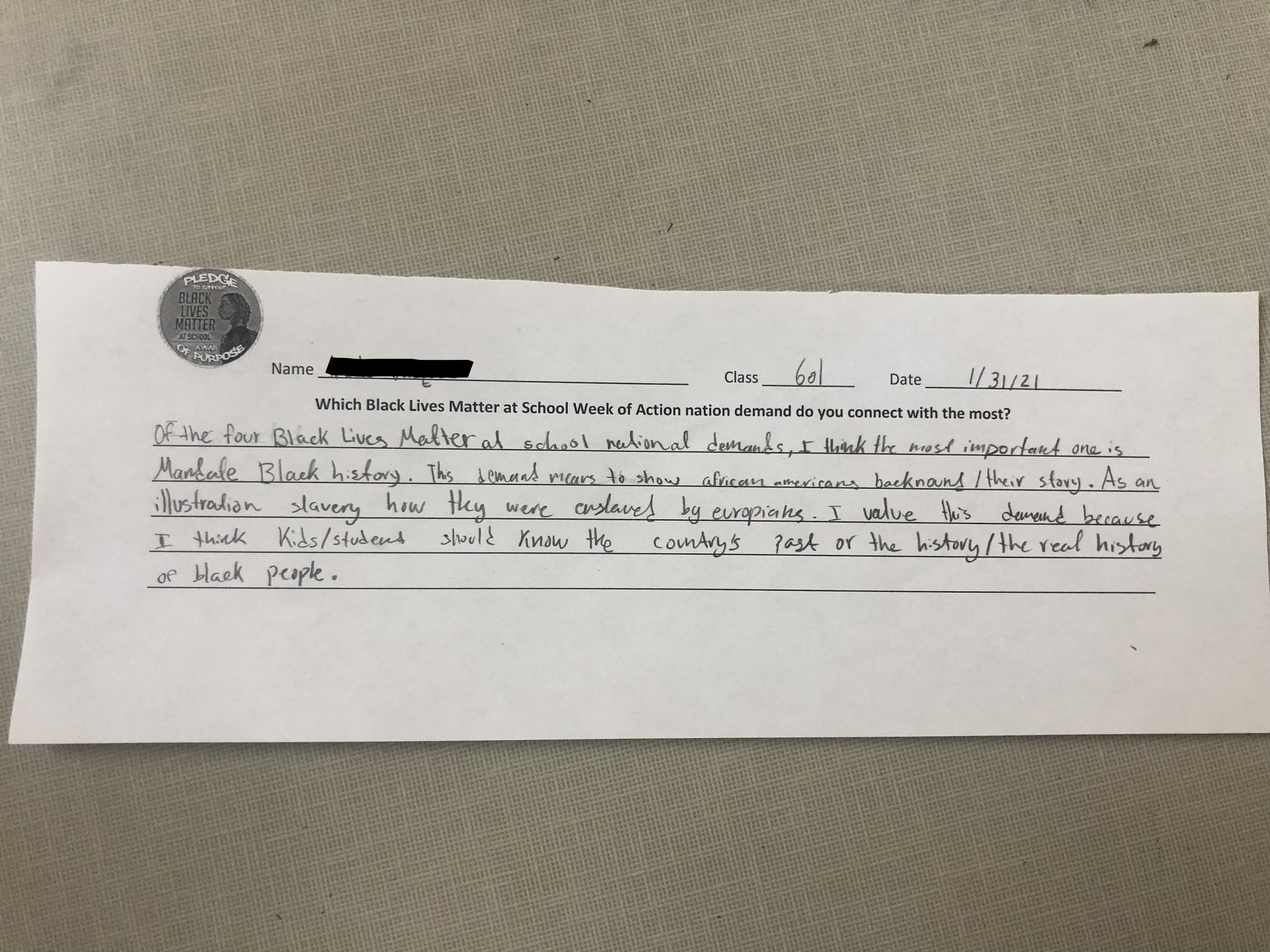
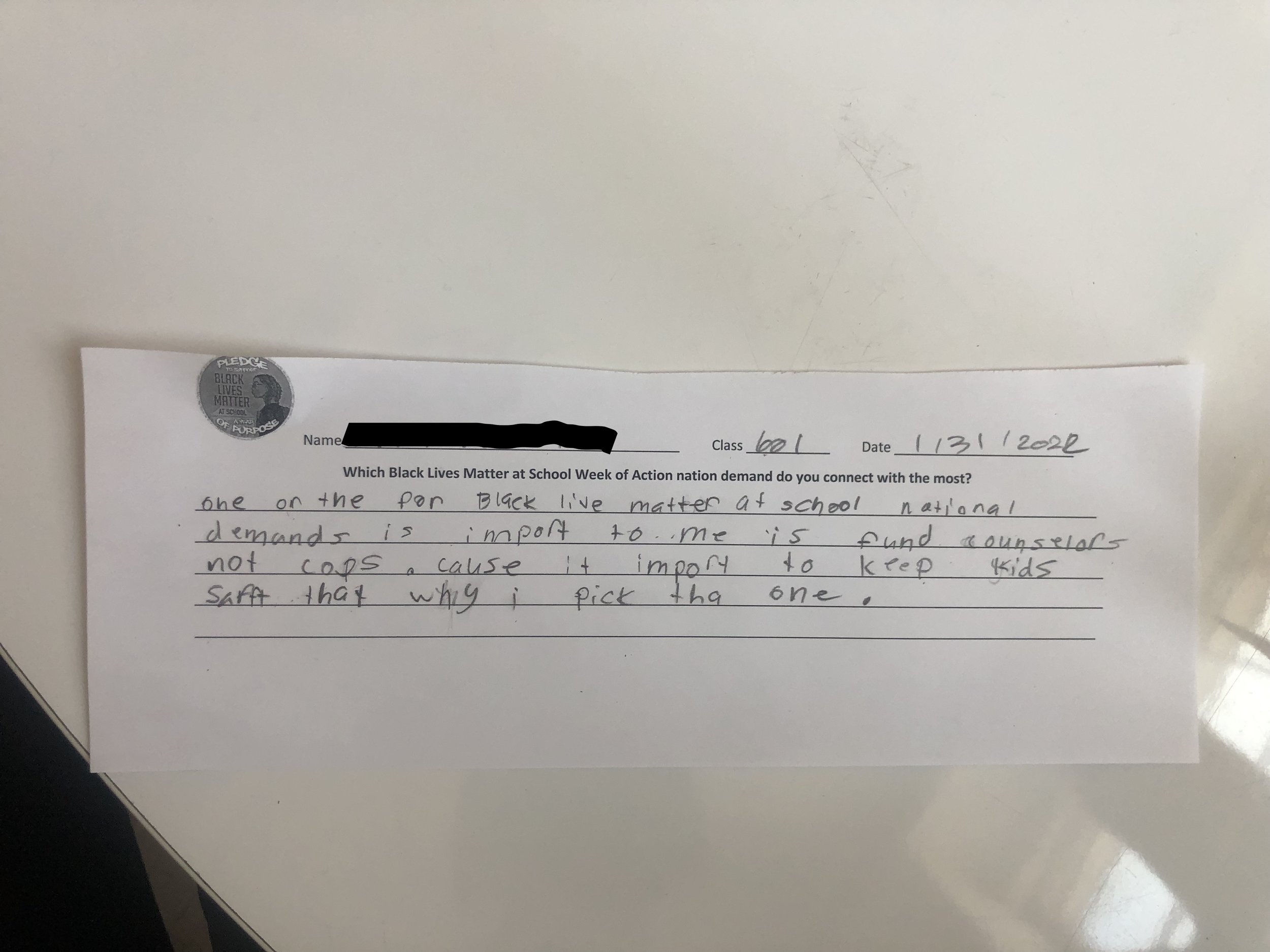
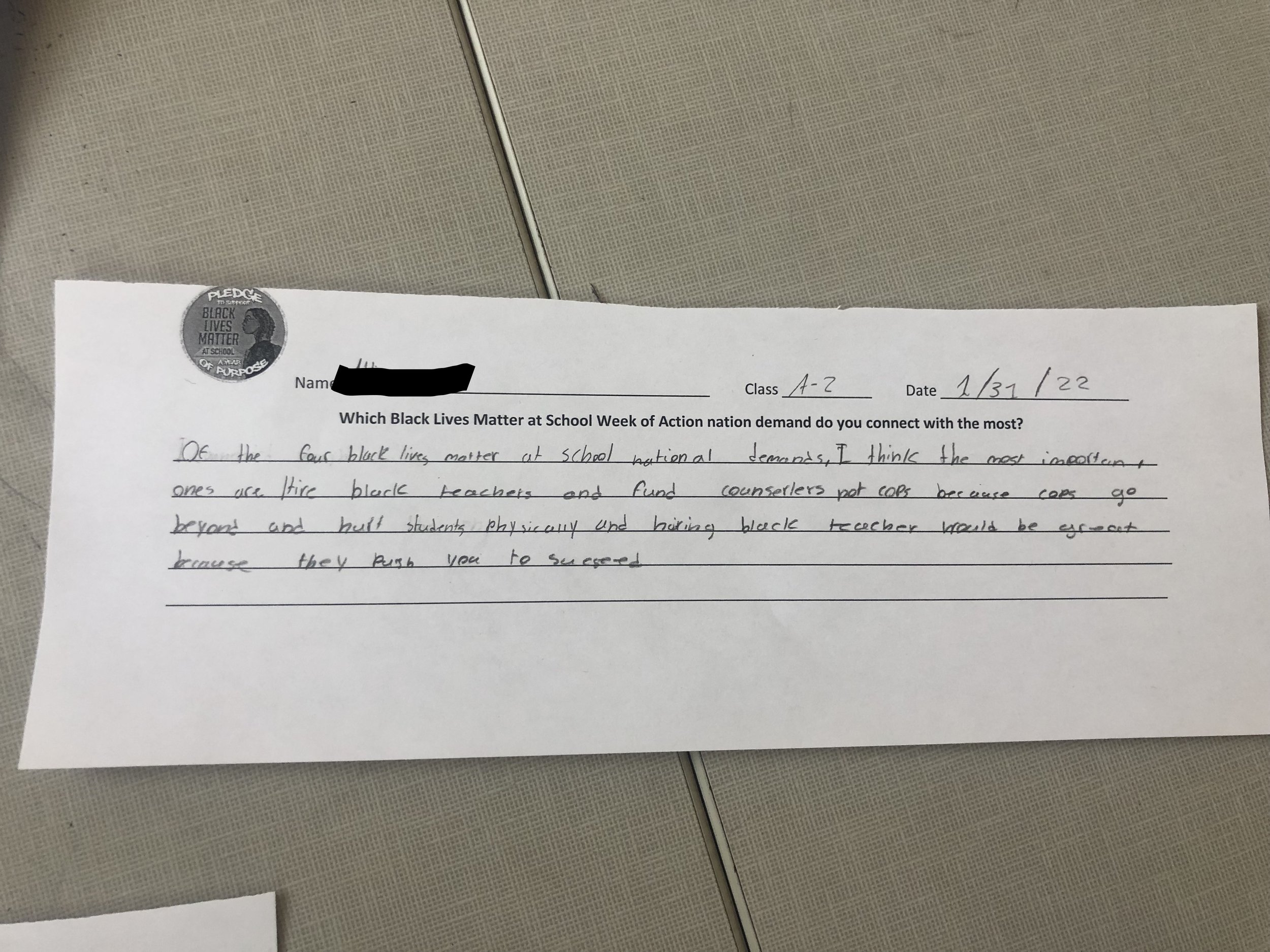
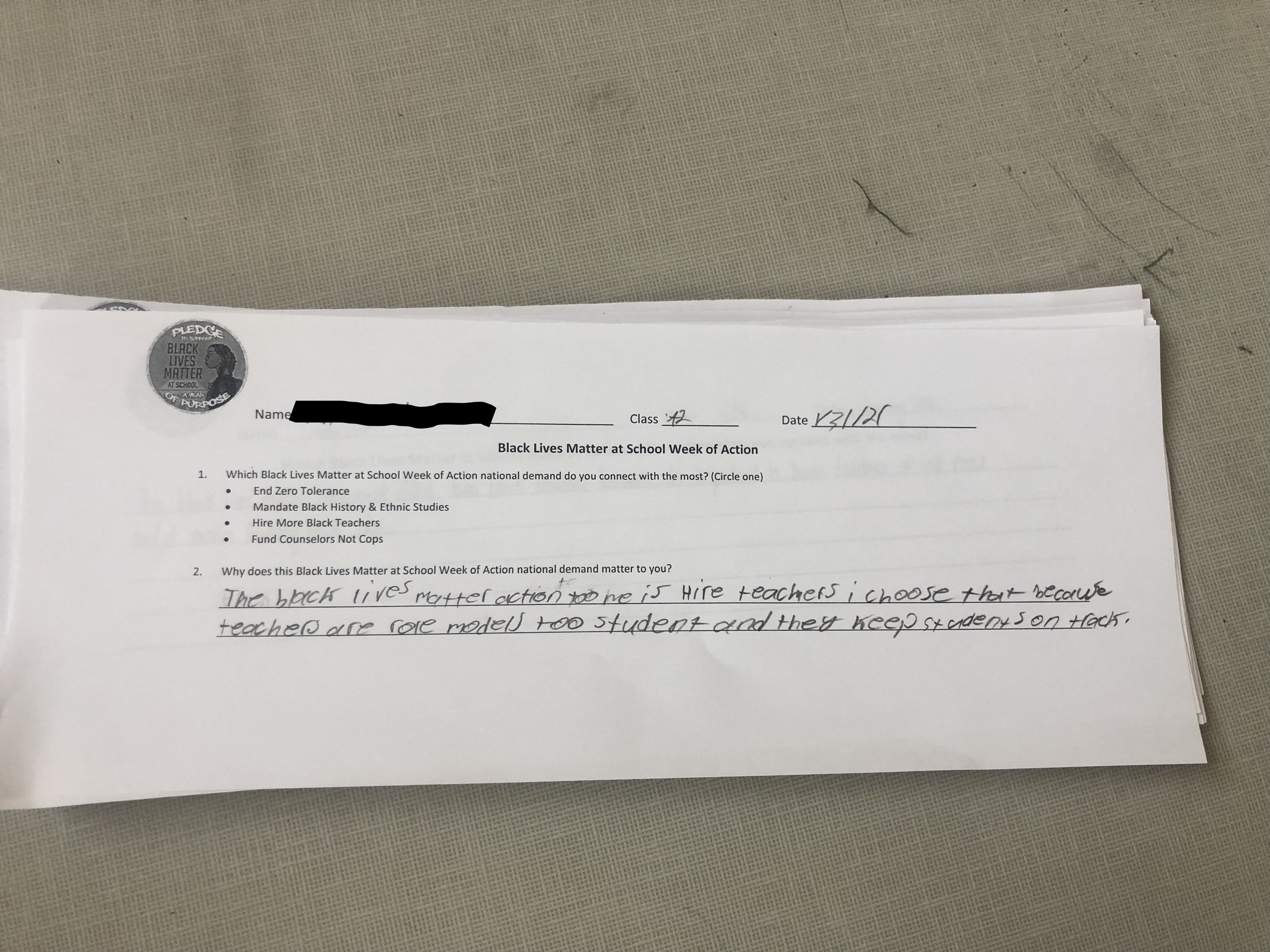
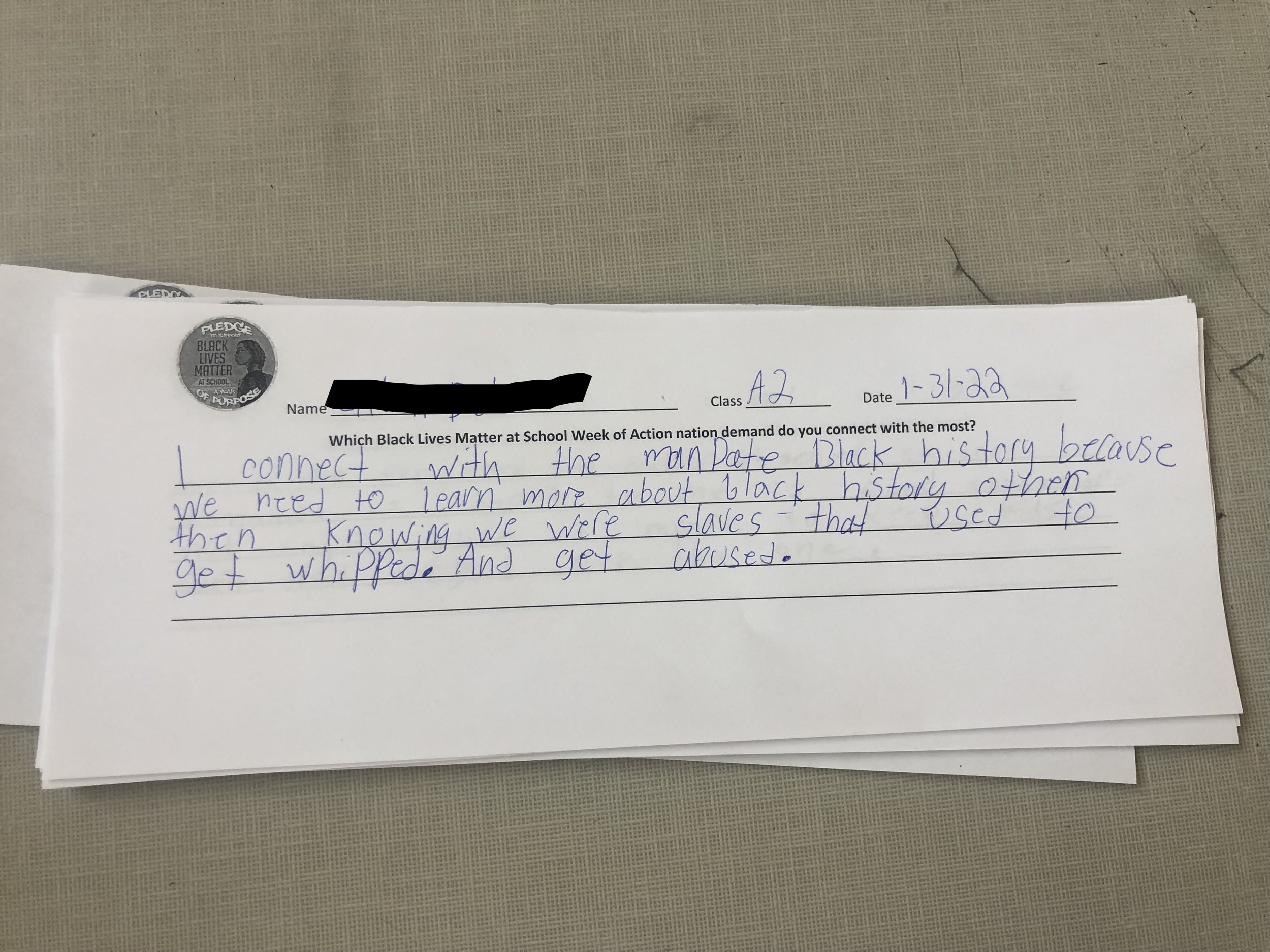
This introductory lesson provided the foundation for students to continue the week-long inquiry. Between Humanities and Advisory classes, middle schoolers at MacFarland will think deeply about the 13 guiding principles, national demands, and how to ensure that the vision of Black Lives Matter at School comes to fruition at their school. As one student lingering after class expressed, “I had fun learning today!”
For more images from the visit to Holmes’ class, check out this album.
We also have teaching resources aligned with Black Lives Matter at School Year of Purpose.
Kimberly Ellis is an Education Anew Fellow with Teaching for Change and Communities for Just Schools Fund. Read more of her stories.


